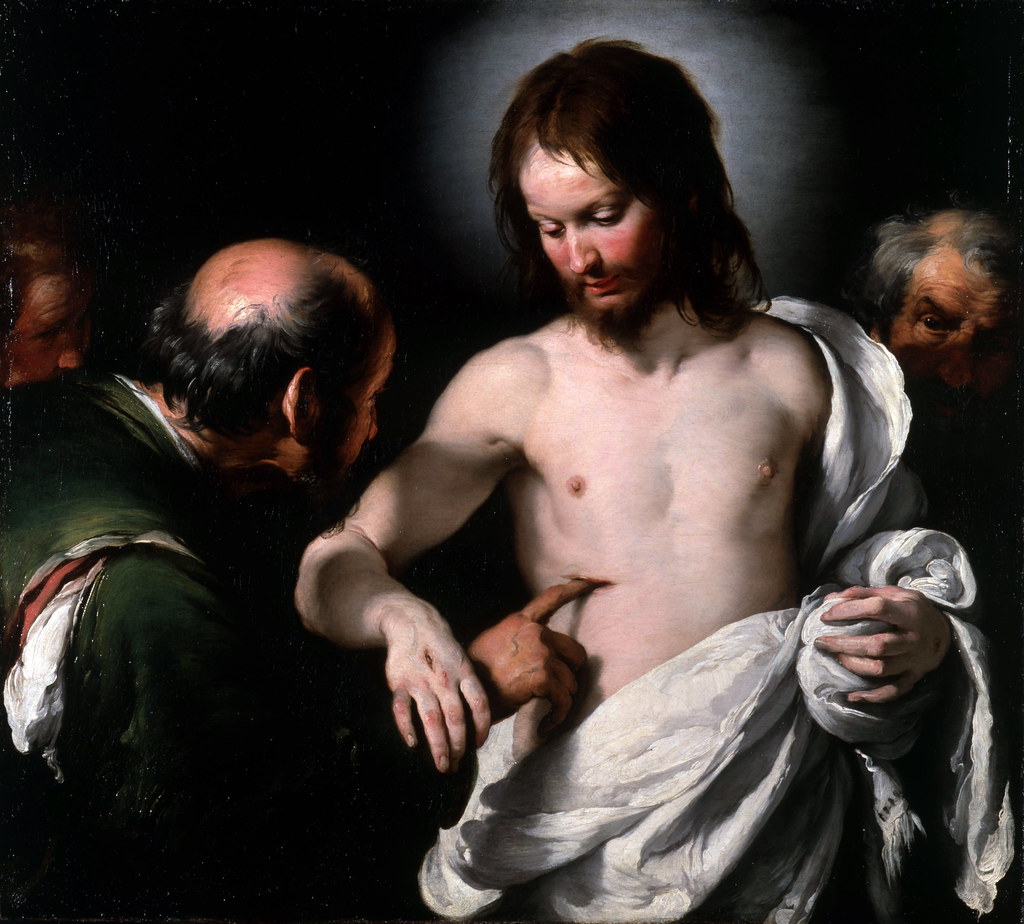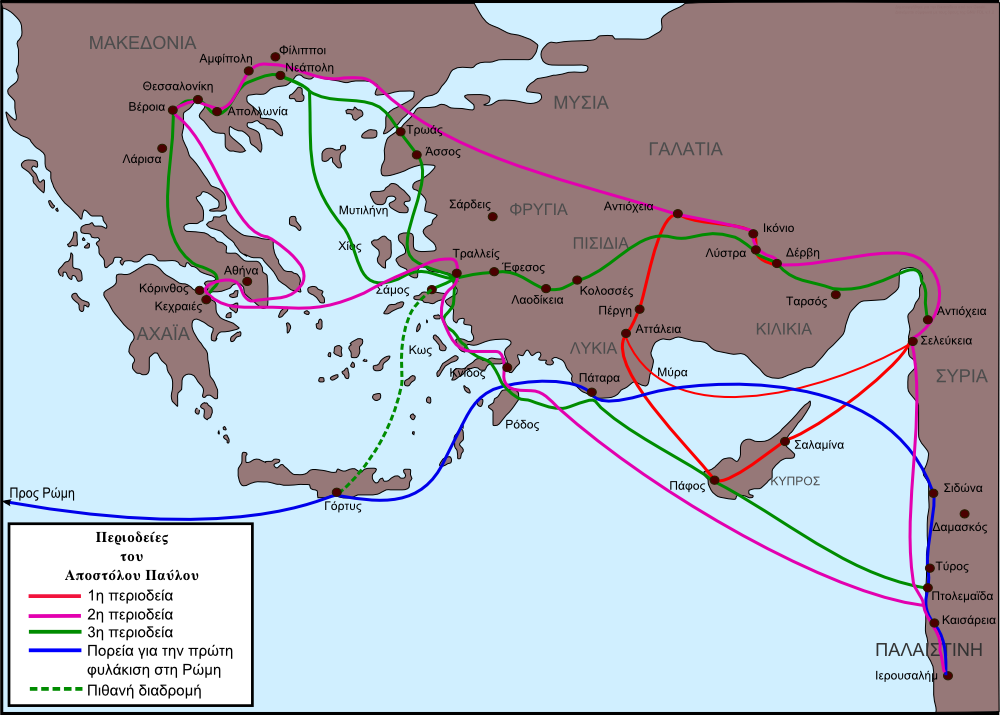Blog
Bulletin Articles
Are You the Antichrist?
Monday, March 14, 2022
The title is kinda clickbaity, I admit. However, I claim 1 John 2:22 as my justification. The Holy Spirit uses the definite article, and who am I to argue grammar with the Holy Spirit?
Mention of the antichrist these days directs the minds of many religious people toward the tragedy unfolding in Ukraine. As always whenever there are wars and rumors of wars, they become convinced that the end times are upon us and start trying to map current events against the apocalyptic imagery of Biblical prophecy. Surely the ten horns of the beast are ten Russian oligarchs, and its seven heads are the seven branches of the Russian armed forces, amirite?
One of the favorite passages of these enthusiasts is one of the least favorite passages of careful Bible students, the description of the man of lawlessness in 2 Thessalonians 2. Candidly, I have no idea who the man of lawlessness is, and there is no Scriptural way to tell. However, this does not deter them from applying the passage to their least favorite world figure, which could be anybody from the pope to Vladimir Putin.
Somewhere along the way, this baleful character got mixed up with the Johannine antichrist. Nowadays, if you mention the antichrist to somebody, they probably will envision a boy with a demonic grin and eyes that glow red. He’s the capital-A Antichrist!
However, the true nature of the antichrist is much different and more straightforward. John tells us plainly in the abovementioned verse that the antichrist is anyone who denies the Father and the Son. You don’t have to be conceived at a witches’ Sabbath in the dark of night to qualify; you only have to be anti-Christ. John notes in v. 18 that there are many such people.
We can be one of them. Like the apostates of v. 19, we can reveal ourselves as antichrists by going out from the people of God. It’s tough to argue that you have not denied Christ when you have detached yourself from His body!
However, on the terms of v. 22, we can keep showing up and be the antichrist anyway. If we deny God when we aren’t assembled, the things we say for a few hours a week don’t count for much.
The number of ways we can end up in this trap is limited only by the ingenuity of the devil. Confessing that Jesus is the Christ is a consequential statement. It means that we claim Him as our Lord and maintain that He ought to be everybody else’s Lord too.
What, then, when His Lordship is not evident in our words? We downplay His control over our lives because we don’t want our worldly friends to think we’re Bible-thumpers. We tell them that they’re just fine outside His church because we don’t want to start an uncomfortable conversation. That isn’t exactly pro-Christ behavior!
So too, we become the antichrist when we deny Him with our actions. If Jesus is Lord, we must live like it. If we don’t, we reject His Lordship, and those around us will hear our denial loud and clear.
The antichrist isn’t a trope for Christian-ish horror movies or wild-eyed would-be prophets. It’s a sober warning for us. We are responsible daily for lifting up the name of God. When we do the opposite, John wants us to understand the seriousness of the step we have taken.
Why Were the Disciples So Sure?
Tuesday, March 08, 2022
One of the most significant proofs of Jesus’ resurrection is the early disciples’ sincere belief that He had risen. They maintained this belief in the face of great hostility from earthly powers, enduring persecution, prison, and death rather than recanting. Whatever else they were, they were not deceivers.
However, we also must ask why they were so sure that the risen Lord had appeared to them. Many of us have had a hallucination at some point in our lives (I have), and the ancients were aware of hallucinations too. If I were standing before the Sanhedrin, I’d want to be really, really sure that my mind wasn’t playing tricks on me before I spoke up!
One of the most elegant Biblical explanations of the disciples’ certainty appears in 1 John 1:1-2. John probably wrote these words to contradict the Gnostic claim that Jesus did not come in the flesh, but they serve just as well as a defense of the resurrection. They didn’t glimpse the risen Jesus at a distance or see Him early in the morning when they were fuzzily waking up.
Instead, they heard Him. They saw Him. They studied Him intently. They touched Him with their hands. Their testimony isn’t based on wishful thinking. It’s based on the firm experience of their senses.
A study of John’s gospel reveals some of these experiences. John watched as a Roman soldier plunged His spear into Jesus’ side, and the corpse didn’t even twitch. He looked into the tomb where Jesus had been laid and saw discarded grave wrappings but no body. He heard Mary Magdalene relate that she had laid hold of the feet of the risen Jesus as she worshiped Him. He was in the locked upper room when Jesus appeared in the midst of the disciples and displayed the wounds in His hands and side for their inspection. He watched later when Thomas reached out and touched those wounds. He ate breakfast with Jesus as the sun rose over the Sea of Galilee.
To summarize, John had all the evidence he needed to be 100 percent convinced that Jesus was a real human being who really died and really was restored to life by God. So did the others. They knew this had happened.
In an earthly sense, their experience did them no favors. It set them against all the rulers of their world, men who were determined that Jesus had not risen and were indifferent to the evidence. Without the resurrection, they could have lived ordinary, peaceful lives. Because of it, they were hounded to the end of their days.
However, it also gave them the most precious hope imaginable. If Jesus was raised to life, they could trust His promise that they also would be raised to life through Him. Because of their steadfastness in testifying to their experiences, we can trust it too. Next to this, nothing else matters, either to them or to us.
Peter's Succession Plan
Tuesday, March 01, 2022.jpg)
The claims of the Catholic Church to spiritual authority depend on two doctrines. The first is apostolic succession, which argues that bishops are the successors to the authority of the apostles. The second is Petrine succession, which views the popes as the authoritative successors of Peter. If both apostolic and Petrine succession are valid, the Catholic Church is indeed the one true church.
Not surprisingly, the oral traditions of the Catholic Church confirm both doctrines. However, from a cynical perspective, this looks an awful lot like, “You have to listen to me because I said so!” Only those who already have accepted the spiritual leadership of Rome will find these arguments persuasive.
What of the Scriptures? Unlike oral tradition 2000 years old, all Christians acknowledge their authority. The New Testament is filled with the words and writings of the apostles in general and of Peter in particular. If indeed the various succession doctrines were intended to be the bedrock of the Church until the end of time, we would expect first-century speakers and writers to have a lot to say about it.
This isn’t the case. Catholic apologists point to 2 Timothy 2:2 as evidence for apostolic succession, but it reads to me like a command to teach rather than a grant of authority. Besides, who says Timothy was a bishop anyway? At the time of the writing of 1 and 2 Timothy, he was still a young man, unlikely to be qualified by first-century standards.
Things are even hazier when it comes to Petrine succession. No less an authority than Joseph Ratzinger (the former Pope Benedict XVI) concedes in the tract “Peter and Succession”, “There is no explicit statement regarding the Petrine succession in the New Testament.” If we want justification for Petrine succession, we must needs look outside the word.
Nor is that all. Peter may not have mentioned handing off his authority to Pope Linus or anybody else, but he did explicitly set out his plans for ensuring that Christians would be taught after his death. They appear in 2 Peter 1:13-15. He says, “I think it is right, as long as I am in this bodily tent, to wake you up with a reminder, since I know that I will soon lay aside my tent, as our Lord Jesus Christ has indeed made clear to me. And I will also make every effort so that you are able to recall these things at any time after my departure.”
Basically, 2 Peter was Peter’s succession plan. He, along with the other apostles and prophets, ensured that his inspired teaching would be carried forward by writing it down. Today, 2000 years later, we still can “recall these things” by reading what they wrote.
This doesn’t help the Catholic Church much, but it helps us tremendously. We don’t have to rely on somebody who claims to have secret knowledge in order to figure out what God wants us to do. Instead, we only have to open the Book. Peter and the other writers will tell us all we need to know. It’s up to us to obey it.
Vessels for Honor
Wednesday, February 23, 2022
Every Christian should aspire to be useful to the Lord. It’s the only decent response available to those who have been rescued from so great a death by so great a salvation. None of us ever will be able to repay Jesus for what He has done for us, but we at least should do something!
This is a priority God shares. The great promise of salvation by grace through faith in Ephesians 2:8-9 concludes with the observation in v. 10 that we have been created in Christ Jesus for good works. When Jesus is confronted with the lukewarm Laodiceans in Revelation 3, He is revolted by them. The do-nothing disciple has fallen prey to a soul-destroying delusion.
We should yearn to be useful, and God expects us to be useful regardless. However, not all Christians are equally valuable in the kingdom. This is not determined by the gifts God gives us. Instead, Paul tells us in 2 Timothy 2:21 that we make ourselves useful by purifying ourselves from dishonorable things. Christians who do this are the fancy dishes you bring out for important guests; Christians who don’t do this are the chamber pots you hide away in the commode.
Next, Paul describes the dishonorable behavior Timothy must reject, the youthful lusts that carry away so many young people. However, merely keeping ourselves from sin is not enough, nor is merely avoiding the company of the wicked. Rather, we actively pursue righteousness with righteous people.
Interestingly, though, Paul does not consider an immoral life to be the greatest threat to the disciple’s usefulness. He devotes one verse (in our Bibles) to lust and four verses to contentiousness. The latter apparently is a much more significant problem.
This tracks with my own experience. Usually, the chamber-pot disciples I see haven’t been overwhelmed by worldliness. Those folks are long gone. Instead, the dishonorable vessels in the house of God are the Christians who can’t get along with others.
What do you do with people like that? You can’t give them a Bible class to teach because they’ll cause trouble in the church. You can’t send them out to reach the lost because they’ll alienate every outsider they talk to. Instead, into the commode they go, and you hope they won’t give you too much grief from in there!
Basically, if we don’t know how to treat others graciously, there’s not much that God can do with us. Thankfully, Paul tells us how to be gracious. Don’t fight over dumb stuff. Be gentle with everybody. Especially, be gentle with the people who disagree with you. Don’t try to run them over. Try to persuade them instead, and leave the work of conversion to the word of God in their hearts.
This is a spiritual challenge I understand well. I had 2 Timothy 2:24-25 taped to my bathroom mirror for many years, and I still struggle with the problem today. I know how easy it is to lose sight of others in the glare of my own certainty. However, only as we share Jesus’ meekness toward them can we be useful in His work.
The "We" Passages in Acts
Friday, February 18, 2022
Like the other historical books of the New Testament, neither Luke nor Acts explicitly identifies its author. However, it is evident from the introduction to each book and the style used throughout each that both were written by the same hand. The first identification of this writer that we still have comes from Irenaeus, who wrote during the second century AD and attributed both books to Luke, the companion of Paul.
Not surprisingly, generations of scholarly skeptics have challenged Luke’s authorship. After all, the later a work is, the less reliable it is as a record of the miraculous events of the New Testament era. In particular, people who want to challenge the historicity of the resurrection must insist on a late date for Luke and Acts.
However, a major problem exists in Acts for those who want to make this claim. Acts 16:10-17 and Acts 20:5-28:16 are written in first-person plural. Taken at face value, these passages are written by an eyewitness who traveled with Paul from Troas to Philippi, then from Philippi to Rome some years later. This is consistent with Irenaeus’ attribution of Acts to Luke, and even if Luke wasn’t actually the author, another first-century companion of Paul’s was. This pushes the composition date for both Luke and Acts much earlier than any Biblical skeptic wants it to be!
In reply, such skeptics make two counterarguments. Some claim that the “we” passages are an older narrative inserted into Acts by a later editor (“Luke”). However, this isn’t consistent with the way that “Luke” operates elsewhere. In Luke 1:1-4, he acknowledges that he uses eyewitness testimony from others in his narrative. However, nowhere else does he use first-person narrative without attribution.
In the gospel of Luke, at least, he seems to cite eyewitness by mentioning their names. For instance, in the Emmaus narrative of Luke 24:13-35, even though the two disciples who see Jesus are equally important, the only one whom “Luke” names is Cleopas. This implies that Cleopas is “Luke’s” source. Nonetheless, this eyewitness testimony is presented in third person, along with most of Luke-Acts. To break this pattern, especially when doing so creates the false impression that “Luke” is an eyewitness, is utterly at odds with the skill and care with which he writes.
Others have suggested that the entirety of Acts is a forgery, and the “we” passages are inserted into it to lend verisimilitude. Though theoretically possible, this scenario is extremely implausible. For one thing, it’s not consistent with the way that forgers of the era operated. Others who wanted to add credibility to their false gospels inserted a major early-church figure (Peter, James, Thomas, etc.) to do it. They didn’t switch to first-person plural and hope somebody noticed.
Second, if a forger wanted to write himself into Luke-Acts, why do it there? The “we” passages are travel narratives with an occasional miracle sprinkled in. They are among the least doctrinally significant portions of both books. Why make yourself an eyewitness to the journey from Chios to Samos, but not an eyewitness to the empty tomb? Why put yourself on the Alexandrian ship sailing for Italy but not in the upper room? Even lying about having seen the Ascension would have been more meaningful!
By far the most reasonable explanation for the “we” passages is that they are what they seem to be: the travel diary of a first-century Christian who happened to be a companion of Paul during part of his travels and, consequently, happened to be kicking around in Palestine for two years a couple of decades after the crucifixion. None of this is terribly significant on its own, but it reveals Luke as an early historian of the most important events of human history.


